八年级英语下(Unit4 基础知识梳理-B)
英语人教版八年级下册unit4 SectionB 2a-2c

Unit4 Why don’t you talk to your parents? Section B( 2a-2e)Learning goals:一、语言知识:1.熟练掌握以下词汇和短语:opinion, skill, typical, football, cut out, quick, continue, so that, compete, not…until, compare…with, development, cause……2.熟练掌握以下句型:However the tired children don’t get home until after 7:00p.m.Others are practicing sports so that they can compete and win.In some families, competition starts very young and continues until the kids get older.They are always comparing them with other children.Doctors say too much pressure is not good for a child’s development.二、语言功能:让学生学会运用本课所学的语言知识表达中外学生面临的生活压力及应对策略三、学习策略:1.依据文章题目和所给图片,预测(predicting)文章内容2.通过略读(skimming)的方式,猜测文章大意。
3.借助关键词,通过寻读(scanning)的方式,找寻细节内容。
四、文化知识:通过对中外学生学习压力的进一步了解与学习,让他们学会正确面对和处理自己学习生活中的压力,学会经常与父母沟通、学会缓解压力自我放松,从而增加生活的乐趣,更懂生活,爱生活。
Step I Preview1. Ask the students to put the following phrases into English. After that let the students write them down.(1)上课外辅导班____________ (2) 学习考试技巧_______________(3) 进入一个好的高校_______________ (4) 一个典型的美国家庭_________________(5) 我的两个男孩之一________________ (6) 删除______________________(7) 吃一顿短暂的晚饭________________(8)变得更大_____________________(9) 总是做________(10)和其他的孩子比较他们______________ (11)太多的压力____________________ (12)不利于一个孩子的发展__________________2. Show the students the following sentences and have the students translate these sentences into English orally.(1) 或许我可以减掉他们几个活动。
八年级下unit 4知识点总结

Unit 4 知识点总结一、重点单词和短语(key words and important phrases )黑体单词要求必须背过。
***特别记忆:hide—hid—hiden(隐藏;躲藏)sell—sold—sold(卖,出售)steal—stole—stolen(偷盗,窃取)little(少)—less(较少,更少)—least(最少)***短语:(注:括号里的为例句,希望您能把它记住,会用)depend on 依靠,依赖,取决于,根据(Children depend on their parents for food and clothing.)pass on 传播,前进(People pass on thier knoeledge by telling stories.)by hand 手工,用手(They write each word by hand.)keep on 继续(No matter what you have, keep on reading.)in seconds 在很短的时间内(People are able to connect and share information in seconds .)far away 遥远(His village is far away from the railways.)aside from 除此之外(Aside from her nose,she is a petty girl.)take up 占据,占用,开始从事(The Internet can be a uesfull tool,but don’t let it take up all of your time.)set up a time 约个时间(They have set up a time to meet again.)二、结构和句型1、use sth. to do sth. 用某物去做......eg: I like to use the Internet to read about sports and technology.2、chat with sb.和某人聊天eg: I like chatting with my friends online.3、plan to do sth.计划做某事eg:We are planning to organize a Donut Club.4、decide to do sth.决定做某事eg:I decided to do all of my research on the Internet.5、one of +the +形容词的最高级+可数名词复数“最......之一”eg:It’s one of the biggest holidays in many countries.6、It is + 形容词+ for sb. to do sth. “某人做......是.......的”eg:It is also possible for common people to read books.7、Sb. pays (sb.) money for sth. 某人为某物付(某人)多少钱Sth. cost (sb.) some money 某物花费某人多少钱Sb. spends some time /money in doing sth. 某人花费多少钱/时间做某事on sth某人在某事上花费了多少钱/时间做It takes sb. some time to do sth. 做某事花费某人一些时间8、realize one’s dream=make one’s dream come true 实现某人的梦想eg:I want to help my grandma realize her dream.=I want to make my grandma’s dream come true.9、sb.be surprised to do sth. 某人对做某事感到惊奇at sth. 某人对某物感到惊奇to one’s surprise 令某人惊奇的是......sth. is surprising 某物令人感到惊奇(注:surprise 、interest、excite、amaze的用法一样,修饰人用以-ed结尾的形容词,修饰物用以-ing结尾的形容词)eg: I am very surprised to see you here.eg: I am very surprised at her success.eg: To my surprise the door is open.10、forget to do sth. 忘记做某事eg: Don’t forget to finish your homework on time.11. too much “太多的”修饰不可数名词too many “太多的”修饰可数名词复数形式much too “太多”修饰形容词或副词eg: He is much too fat because he eats too much meat and too mant sweets(糖果)every day.12. prefer to do sth.宁愿做某事prefer dong to doing 喜欢......胜过......prefer to do rather than(to)do宁愿做.....而不愿做.....eg:I prefer to stay at home.eg:He prefers swimming to sking.eg:He prefered to die rather than steal.三、“互联网的利弊”范文(背过)Advantages and Disadvantages of the InternetInternet is now coming into our life. It brings us not only a lot of convenience, happiness but also troubles. Some of the advantages are truly wonderful.In many ways it makes life easier and simpler.It helps us get things done more quickly.It opens up the world to us.And if a friend lives far away,the Internet makes it easy to stay in touch.On the other hand,some of the disadvantages can become real problems if we don’t take care.Spending too much time online is harmful to people’s health. It may even cause them to be less social with their family and friends.Aside from that ,some people attack the web or use the Internet to steal other’s personal information even baking information.It's very dangerous!The Internet's advantages and disadvantages are shown clearly to us. I think we should make good use of it and stay away from its disadvantages.。
八年级英语下册知识讲义-重点单词(Unit 4 )-人教新目标

初中英语重点单词(下册Unit 4 Why don’t you talk to your parents?)知识梳理allow v. 允许;准许wrong adj. 错误的;不对的guess v. 猜测;估计deal n. 协议;交易relation n. 关系;联系;交往communication n. 交流;沟通argue v. 争吵;争论cloud n. 云;云朵elder adj. 年纪较长的instead adv. 代替;反而;却whatever pron. 任何;每一nervous adj. 焦虑的;担忧的offer v. 主动提出;自愿给予proper adj. 正确地;恰当地secondly adv. 第二;其次communicate v. 交流;沟通copy v. 复制;复印return v. 回来;回去member n. 成员;分子pressure n. 压力compete v. 竞争;对抗opinion n. 意见;想法;看法skill n. 技艺;技巧typical adj. 典型的football n. 足球continue v. 持续;继续存在compare v. 比较crazy adj. 不理智的;疯狂的push v. 推动;移动development n. 发展;发育;成长cause n. 造成;引起usual adj. 通常的;寻常的perhaps adv. 可能;大概;也许二、重点单词【单词学习】1. allow v. 允许;准许【用法】(1)allow sb. to do sth. 允许某人做某事(2)allow (doing)sth. 允许(做)某事(3)be allowed to do sth. 是allow sb. to do sth.的被动结构,意为:被允许做某事。
【例句】His parents don’t allow him to go out at night. 他父母不允许他晚上出去。
Unit4 知识清单 默写-人教版八年级英语下册
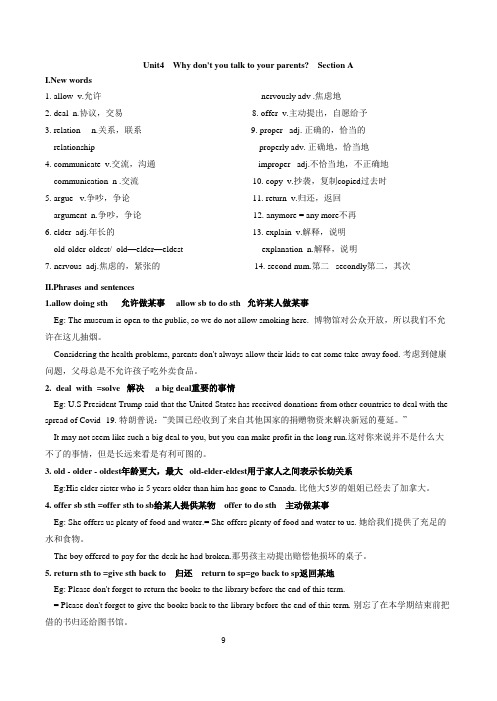
Unit4 Why don't you talk to your parents? Section AI.New words1. allow v.允许 nervously adv .焦虑地2. deal n.协议,交易 8. offer v.主动提出,自愿给予3. relation n.关系,联系 9. proper adj. 正确的,恰当的relationship properly adv. 正确地,恰当地4. communicate v.交流,沟通 improper adj.不恰当地,不正确地communication n .交流 10. copy v.抄袭,复制copied过去时5. argue v.争吵,争论 11. return v.归还,返回argument n.争吵,争论 12. anymore = any more不再6. elder adj.年长的 13. explain v.解释,说明old-older-oldest/ old—elder—eldest explanation n.解释,说明7.nervous adj.焦虑的,紧张的 14. second num.第二 secondly第二,其次II.Phrases and sentences1.allow doing sth 允许做某事 allow sb to do sth 允许某人做某事Eg: The museum is open to the public, so we do not allow smoking here. ·博物馆对公众开放,所以我们不允许在这儿抽烟。
Considering the health problems, parents don't always allow their kids to eat some take-away food. 考虑到健康问题,父母总是不允许孩子吃外卖食品。
人教版八年级下unit4重点知识,语法讲解
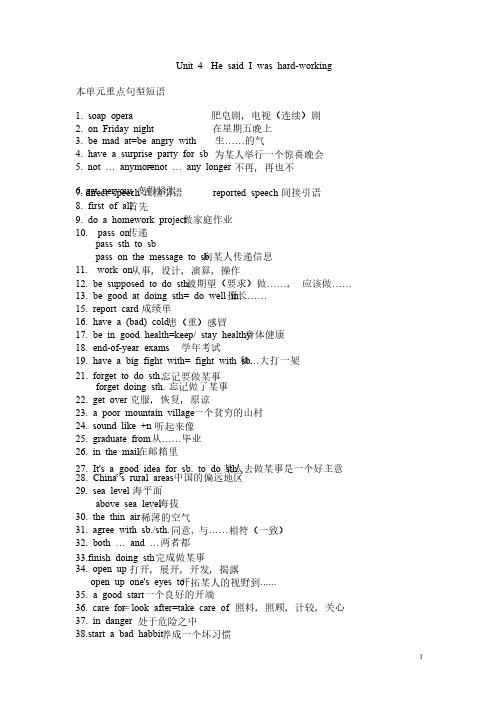
Unit 4 He said I was hard-working 本单元重点句型短语本单元重点句型短语1. soap opera 肥皂剧,电视(连续)剧2. on Friday night 在星期五晚上在星期五晚上3. be mad at=be angry with 生……的气的气4. have a surprise party for sb 为某人举行一个惊喜晚会5. not … anymore =not … any longer 不再,再也不不再,再也不6. get nervous 变得紧张变得紧张7. direct speech 直接引语直接引语 reported speech 间接引语间接引语8. first of all 首先首先9. do a homework project 做家庭作业做家庭作业10. pass on 传递传递pass sth to sb pass on the message to sb 向某人传递信息向某人传递信息11. work on 从事,设计,演算,操作12. be supposed to do sth. 被期望(要求)做……, 应该做……13. be good at doing sth= do well in 擅长……15. report card 成绩单成绩单16. have a (bad) cold 患(重)感冒患(重)感冒17. be in good health=keep/ stay healthy 身体健康身体健康18. end-of-year exams 学年考试学年考试19. have a big fight with= fight with sb. 和…大打一架大打一架21. forget to do sth. 忘记要做某事忘记要做某事 forget doing sth. 忘记做了某事忘记做了某事22. get over 克服,恢复,原谅克服,恢复,原谅23. a poor mountain village 一个贫穷的山村一个贫穷的山村24. sound like +n 听起来像听起来像25. graduate from 从……毕业毕业26. in the mail 在邮箱里在邮箱里27. It's a good idea for sb. to do sth. 某人去做某事是一个好主意28. China‟s rural areas 中国的偏远地区中国的偏远地区 29. sea level 海平面海平面above sea level 海拔海拔海拔30. the thin air 稀薄的空气稀薄的空气31. agree with sb./sth. 同意, 与……相符(一致)相符(一致)32. both … and … 两者都两者都33.finish doing sth 完成做某事完成做某事完成做某事 34. open up 打开,展开,开发,揭露open up one's eyes to 开拓某人的视野到...... 35. a good start 一个良好的开端一个良好的开端36. care for =look after=take care of 照料,照顾,计较,关心37. in danger 处于危险之中处于危险之中38.start a bad habbit 养成一个坏习惯养成一个坏习惯39.copy one ‟s homework 抄袭某人的做业抄袭某人的做业40.send one ‟s love 问好问好41.find science really difficult 发现科学真的很难发现科学真的很难 42.make a decision to do sth.=decide to do sth. 决定做某事决定做某事43.decide to do sth 决定做某事决定做某事决定做某事 44.there is no difference between ...and... 在...和...之间没有区别之间没有区别45.it's just that... 只不过,只是只不过,只是46.be over 结束,完成结束,完成47.in the city of 市48.a one-year program 一个一年期的项目一个一年期的项目49.people who need help 需要帮助的人需要帮助的人50.something we can do for them 我们能为他们做我们能为他们做本单元目标句型:本单元目标句型:转述他人话语:What did sb. say? He said I …She said she…They said…1. 许老师告诉我徐梦蝶会说二种语言。
八年级英语下册Unit4知识讲解

八年级英语下册Unit4知识讲解unit 4he said i was hard-working【单元目标】1.单词与短语ever mad anymore snackmessage supposehard-working nervoussemesterworst true disappointinglucky copy hers decisionstart influence peace borderdangerfirst of all 首先pass on 传递be supposed to 被期望或被要求... ...do better in 在......方面做得更好be in good health 身体健康report card 成绩单get over 克服;恢复;原谅open up 打开care for 照料;照顾have a party for sb.为某人举行一次聚会be mad at sb2.目标句型:转述他人话语what did sb. say?he said i …she said she…they said…3.语法直接引语和间接引语【词汇学习】1.mad adj.极为愤怒的;十分恼火的she was mad with me for losing my keys.她为我丢了钥匙而生我的气。
2.anymore adv.再;还(用于否定句)he doesn't come here anymore.他再也不到这儿来了。
3.however adv.无论如何he can answer the question however hard it is.不管问题有多难他都能回答。
4.suppose v.假定;认为;料想;期望what do you suppose you will do after school? 你放学后想干什么?5.nervous adj.紧张的;神经质的i felt very nervous when i went into his office.当我走进他的办公室时,我感到很紧张。
Unit 4 知识点总结+单元练习题人教版英语八年级下册(附答案)
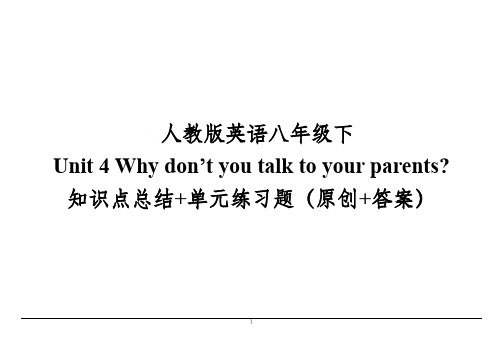
人教版英语八年级下Unit 4 Why don’t you talk to your parents?知识点总结+单元练习题(原创+答案)1一.重点词组:1.what’s wrong 哪不舒服?what’s wrong with sb 某人怎么了?2.look through 快速查看,浏览look up 查询look for 寻找look after 照顾look out = watch out 当心3.big deal 重要的事it’s not a big deal 不是要紧的事4.work out = figure out 解决,弄明白5.not...anymore 再也不6.cut out 删去pare...with 比较8.in one’s opinion 在某人看来9.hang out with sb 和某人闲逛10.after-school class 校外辅导课11.get into fight with sb 和某人打起来12.be angry with sb 对某人生气13.why don’t you do = why not do sth 为什么不做某事14.get on with sb 和某人相处得好15.be nice to sb 对某人友好16.mind sb doing sth 介意某人做某事17.on weekends 在周末二.重点单词1.allow v 允许allow doing sth 允许做某事allow sb to do sth 允许某人做某事sb is allowed to do sth 某人被允许去做某事2.guess v/n 猜have a guess = take a guess 猜一猜guess what? 您猜怎么着?3.deal v 处理;n 交易deal with sth 处理... = handle sth4.relation n 关系relative adj 相对的;n 亲戚relationship n 关系be related to sth 与...有关munication n 交流communicate v 交流6.argue v 争吵argue with sb 和某人争吵argument n 论点7.cloud n 云朵clouds 乌云8.instead adv 反而用法1:放在句首使用:She isn’t allowed to go out at this time of night. Instead, she should do her homework in her bedroom.用法2: 放在句尾连起来使用:She isn’t allowed to go out at this time of night. She should do her homework in her bedroom instead.instead of + 名词性短语9.nervous adj 焦虑的be nervous of/about sth10.offer v/n2offer sb sthprovide sth for sb = provide sb with sth supply sth for sb = supply sb with sth 11.proper adj 恰当的improper adj 不恰当的suitable adj 恰当的12.explain v 解释explanation n 解释13.clear adj 清晰的a clear day 晴天crystal clear 一清二楚的14.return v 返回return back 返还return to sb 还给某人15.member n 成员membership n 会员资格16.pressure n (物理)压力release pressure 释放压力stress (精神)压力reduce stress 减少压力pete v 竞争compete against sb 与某人竞争、攀比competition n 比赛competitive adj 竞争激烈的,好竞争的competent adj 有能力的,能胜任的18.skill n 技巧19.typical adj 典型的20.football n 美式橄榄球soccer 英式足球21.continue v 继续22.crazy adj 疯狂的be crazy about sth 对...感到痴狂23.push v 推push-up 俯卧撑pull v 拉24.develop v 发展development n 发展25.cause v 造成;n 原因cause sb to do sth 引起某人去做某事ual adj 平常的as usual 像往常一样27.perhaps adv 或许probably adv 或许possibly adv 或许34Unit 4 单元练习题一.重点词组考察二.重点单词考察三.课文翻译1. I have _____ _____ (太多) homework so I don’t have enough sleep.2. My parent don’t _____ _____ _____(允许我) hang out with my friends.3. I have _____ _____ (太多) after-school classes.4. I _____ _____ (陷入) a fight with my best friend.5. _____ _____ _____ (你为什么不)go to sleep earlier this evening?6. The house is _____ _____ (已经相当) clean and tidy.7. I found my sister _____ _____ (翻找) my things yesterday. 8. I guess you could tell her _____ _____ _____(去道歉).9. My problem is that I can’t _____ _____ _____ (和某人相处) my family. 10. My _____ _____ (大哥) is not very nice to me.11. He always _____ _____(拒绝) let me watch my favorite TV show. 12. It’s not easy _____ _____ _____ (处于你这个年龄). 13. You should _____ _____ _____ (提供去帮助).14. You don’t _____ _____ _____ _____ _____ _____ _____ (介意他一直在看电视).15. My sister borrows my clothes _____ _____ (没有问). 16. I am _____ _____ (担心) my school grades.17. You should tell him that _____ _____ _____ (抄别人的作业) is wrong. 18. _____ _____ _____ (他们中的许多人) are learning exam shills so that they can get into a good high school.19. They are always _____ _____ _____ (把他们和...做对比) other children.四.单项选择1.We can’t take this away until she _____ yes.A.will sayB. sayC. saysD. said2.She finally agrees with us _____ she did not like the plan at the beginning.A.ifB. unlessC. althoughD. when3.---Thanks for your sincere suggestion.---It’s my pleasure. Hope things _____.A.work outB. look outC. try outD. find out4.We are not allowed _____ or drink in the classroom.A.eatB. to eatC. eatingD. eaten5.The little boy _____ his book to the girl.A.providesB. suppliesC. bringsD. offers6.---Young people are always talking on their phones.---Yes, indeed. They should put down their phones and talk to people around them _____.A.stillB. eitherC. tooD. instead7.My _____ sister is three years _____ than me..A.elder; olderB. elder; elderC. older; elderD. older; older8.They didn’t leave for home _____ they finish their work.A.untilB. ifC. unless9.Chinese parents tend to compare their children _____ other kids.A.forB. toC. byD. with10.Do you mind me _____ the radio? It’s too noisy.A.turning upB. turning onC. turning downD. turn down11.Gloria offers _____ us prepare for the exams.A.helpB. to helpC. helpingD. helped12.Did you watch the TV show _____ the evening of August 24th?---Yes, I did. _____ my opinion, it’s wonderful.A.in, InB. in; OnC.on; OnD. on, In五.完形填空As though things weren’t 1._____ enough last spring, a wild turkey started showing up on my block. It’s normally one of the busiest intersections in Minneapolis, but this turkey walked down the sidewalk day after day 2._____ she belonged. As word 3._____ about her, more and more people came out to see her. A young woman told me that they had named her Tina—Tina the Turkey. Tina must have been 4._____ eggs in front of the neighbors’ house. She would sit and wiggle her rump in the same place in their yard every day. One day she walked with five other 5._____ through the parking lot, 6.______ the two-and-a-half-foot cement wall, and into the yard. I watched in surprise—six wild turkeys! One had her feathers ruffled; I think it must have been Tina. This was her 7._____ now. There were many days when Tina would stand in the parking lot—a dangerous place for a 8._____ bird—and refuse to move, blocking cars from coming or going. This became a show with Tina in the starring role until the day a new character appeared on stage: an strange-looking man with black hair. He looked 9._____. He was covered in dirt, his posture stiff. He approached Tina and began to strike curious poses in a beautiful dance. Tina 10._____ him in this dance. Together, they were art in motion. And because of the stay-at-home order, I got to see them. I’ll always remember this turkey when I think back on the corona-virus pandemic. She brought a lot of joy to a community at a time when people desperately needed an escape.1.A. funny B. strange C. wonderful D. humorous2.A. as if B. if C. even if D. even though3.A. gave out B. handed out C. set out D. got out4.A. lying B. laying C. lied D. laid5.A. neighbors B. places C. turkeys D. women6.A. on B. up C. in D. with7.A. place B. turkey C. right D. wall8.A. fat B. strong C. powerful D. slow-moving9.A. homeless B. hopeless C. strange D. careful510.A. embraced B. joined C. welcomed D. invited 答案:一.重点词组1.what’s wrong with sb2.look through3.look for4.big deal5.look out6.work out7.not ... anymore8.cut outpare ... with ...10.hang out with sb11.after-school class12.in one’s opinion13.get into fight with sb14.be angry at sb15.be friendly to/with sb16.on weekends17.sllow doing sth18.allow sb to do sth19.be allowed to do sth20.guess what21.a clear day22.crystal clear23.return back24.return to sb25.be crazy about26.cause sb to do sth27.as usualpete with/against29.help with sth630.reduce stress; release pressure31.be related to32.find sb doing sth二.重点单词1.relation2.relativemunication; communicate4.argument5.clouds6.continue7.anyway8.proper; improper9.sick; ill10.member11.membership12.neighborhood13.typical三.课文翻译1.too much2.allow me to3.too many4.get into5.Why don’t you6.already pretty7.looking through8.to say sorry9.get on with10.elder brother11.refuses to12.being your age13.offer to help14.mind him watching TV all the time15.without asking16.worried about17.copying others’ homework18.Many of thempare them with四.单项选择1-5 CCABD5-10 DAADC11-12 BD五.完形填空1-5 BADBC6-10 BADAB7。
人教部编版八年级英语下册第4单元笔记重点汇总(可直接打印)

Section A 第一课时笔记重点短语1.have free time有空闲时间2.allow sb. to do sth. 允许某人做某事3.hang out with sb. 与某人闲逛4. after-school classes课外活动课5. get into a fight with sb./ have a fight with sb. 与某人吵架/打架6. until midnight直到半夜7. talk to sb. 与某人交谈8. get enough sleep有足够的睡眠9. write sb. a letter给某人写信10. call sb. up打电话给某人重点单词1、allow作动词,意为“允许”。
(1)allow sb. to do sth. 允许某人做某事His parents don’t allow him to hang out with his friends.他的父母不允许他和朋友出去闲逛。
(2) allow sth. “允许某事”I don't think she will allow it. 我想她不会允许这件事情。
(3) allow doing sth.“允许做某事”We don't allow smoking in our house.在我们家不允许抽烟。
(4) be allowed to do sth.“被允许做某事”Passengers are not allowed to smoke on the bus.在公交车上,乘客不允许抽烟。
2、find sb. doing sth. 发现某人在做某事其中的doing(现在分词)作宾语补足语。
类似的还有: see/watch/hear/notice/feel sb. doing sth. ,意为“看到/观察到/听到/注意到/感觉某人在做某事”。
3、词语辨析:太多:too much+ 不可数名词例:too much homework太多作业太多:too many + 可数名词复数例:too many people太多人太: much too+ 副词或形容词例:much too salty 太咸重点句型1、What’s wrong with. . . ? 意为“……怎么了? ”相当于What’s the matter with. . . ?2、表建议的句型:(1)你为什么不……Why don't you +V原? = Why not +V原例:Why don’t you talk to your parents.=Why not talk to your parents.(2)你应该/可以…You should/could +v.(3)你最好(不)…You’d better (not) +v.(4)你介意….. Would you mind doing…?(5)……怎么样?What about…? =How about…?(6)你认为……怎么样?What do you think of…? = How do you like…? Section A 第二课时笔记重点短语1. look through快速查看;浏览2. be angry with sb. 生某人的气3. a big deal重要的事4. work out成功地发展;解决5. get on with = get along with和睦相处,关系良好6. fight a lot经常吵架/打架7. hang over笼罩8. refuse to do sth. 拒绝做某事9. offer to do sth. 主动提出做某事10. be nice to sb.”对某人友好”相当于be friendly/good/kind to sb.11. mind sb. doing sth. 介意某人做某事12. in future今后13. make sb. angry使某人生气14. worry about sth. 担心某事重点单词1.(1)fight做名词:get into a fight with sb.=have a fight with sb. 与某人吵架/打架(2)做fight 动词:fight with sb. 与某人吵架/打架2. argueargue作动词,意为“争论,争吵”。
人教版八年级英语下册Unit 4知识点
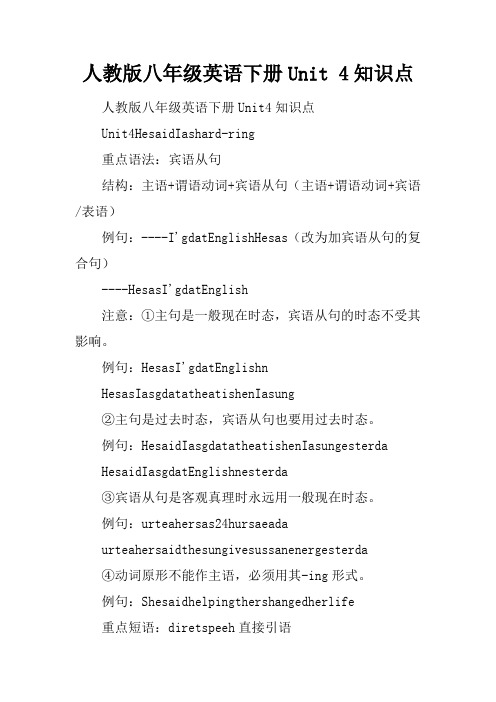
人教版八年级英语下册Unit 4知识点人教版八年级英语下册Unit4知识点Unit4HesaidIashard-ring重点语法:宾语从句结构:主语+谓语动词+宾语从句(主语+谓语动词+宾语/表语)例句:----I'gdatEnglishHesas(改为加宾语从句的复合句)----HesasI'gdatEnglish注意:①主句是一般现在时态,宾语从句的时态不受其影响。
例句:HesasI'gdatEnglishnHesasIasgdatatheatishenIasung②主句是过去时态,宾语从句也要用过去时态。
例句:HesaidIasgdatatheatishenIasungesterdaHesaidIasgdatEnglishnesterda③宾语从句是客观真理时永远用一般现在时态。
例句:urteahersas24hursaeadaurteahersaidthesungivesussanenergesterda④动词原形不能作主语,必须用其-ing形式。
例句:Shesaidhelpingthershangedherlife重点短语:diretspeeh直接引语reprtedspeeh=indiretspeeh间接引语firstfall=atfirst首先passn传递besuppsedtdsth应该做某事begdat=dellin在某方面做得好ingdhealth身体健康getver克服penup打开arefr=taearef=lafter照料;照顾ntanre=ntanlnger=nlnger不再haveald感冒end-f-earexa年终考试getnervus变得紧张frgettdsth忘记做某事(该事未做)frgetdingsth忘记做某事(该事已做)it's+ad+[frsb]+tdsth做某事[对某人来说]……(加形容词)ntext上下文ReadingStrateg(阅读方法)Firstreadfreaning,ntfrdetail(首先理解文段的大致意思,不在于文段的细节部分。
人教版八年级下册英语Unit4知识点详解
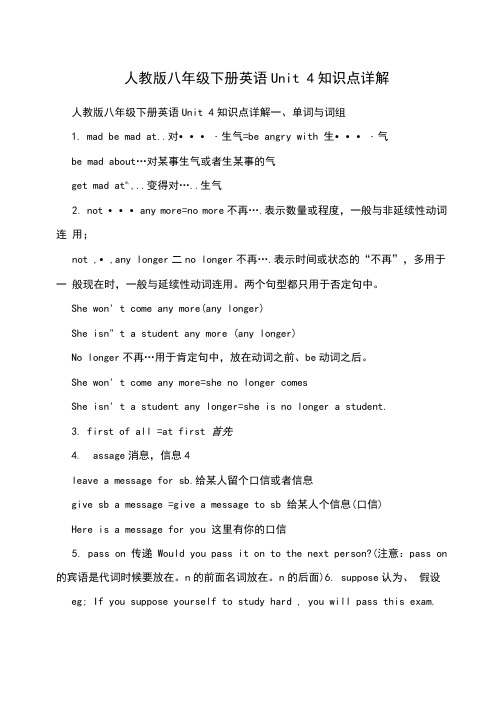
人教版八年级下册英语Unit 4知识点详解人教版八年级下册英语Unit 4知识点详解一、单词与词组1.mad be mad at..对•••・生气=be angry with 生•••・气be mad about…对某事生气或者生某事的气get mad at e,,..变得对…..生气2.not •••any more=no more不再….表示数量或程度,一般与非延续性动词连用;not ,•,any longer二no longer不再….表示时间或状态的“不再”,多用于一般现在时,一般与延续性动词连用。
两个句型都只用于否定句中。
She won' t come any more(any longer)She isn" t a student any more (any longer)No longer不再…用于肯定句中,放在动词之前、be动词之后。
She won' t come any more=she no longer comesShe isn' t a student any longer=she is no longer a student.3.first of all =at first 首先4.assage消息,信息4leave a message for sb.给某人留个口信或者信息give sb a message =give a message to sb 给某人个信息(口信)Here is a message for you 这里有你的口信5. pass on 传递 Would you pass it on to the next person?(注意:pass on 的宾语是代词时候要放在。
n的前面名词放在。
n的后面)6. suppose认为、假设eg; If you suppose yourself to study hard , you will pass this exam.be supposed to do sth. = should7.do well in在…某方面做的好in后面接名词或者动名词eg:She does well in singing and I do well in dancing . They do well in English .8.in good health (in表示在某种状态下,in danger在危险当中)(stayhealthy ;keep healthy 保持健康 healthy 是 health 的形容词) Eg:Wemust be in good health/She is in danger9.get report card拿到(得到)成绩单10.true表示事件本身的真实性即使真与假eg: Is the joke that she said true ?她讲的笑话是真的吗,The news is true.这个消息是真的。
邯郸市第一中学初中英语八年级下册Unit 4知识点复习(含解析)
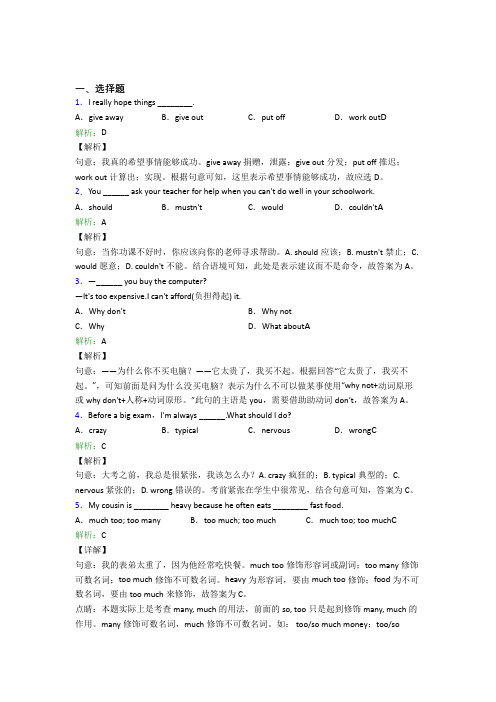
一、选择题1.I really hope things ________.A.give away B.give out C.put off D.work out D解析:D【解析】句意:我真的希望事情能够成功。
give away捐赠,泄露;give out分发;put off推迟;work out计算出;实现。
根据句意可知,这里表示希望事情能够成功,故应选D。
2.You ______ ask your teacher for help when you can't do well in your schoolwork. A.should B.mustn't C.would D.couldn't A解析:A【解析】句意:当你功课不好时,你应该向你的老师寻求帮助。
A. should应该;B. mustn't禁止;C. would愿意;D. couldn't不能。
结合语境可知,此处是表示建议而不是命令,故答案为A。
3.—______ you buy the computer?—It's too expensive.I can't afford(负担得起) it.A.Why don't B.Why notC.Why D.What about A解析:A【解析】句意:——为什么你不买电脑?——它太贵了,我买不起。
根据回答“它太贵了,我买不起。
”,可知前面是问为什么没买电脑?表示为什么不可以做某事使用“why not+动词原形或why don't+人称+动词原形。
”此句的主语是you,需要借助助动词don’t,故答案为A。
4.Before a big exam,I'm always ______.What should I do?A.crazy B.typical C.nervous D.wrong C解析:C【解析】句意:大考之前,我总是很紧张,我该怎么办?A. crazy疯狂的;B. typical典型的;C. nervous紧张的;D. wrong错误的。
2020春鲁教版(五四学制)英语八年级下册:Unit4-Section B(2a-Self Check)

知识点六 be afraid of be afraid of sth./doing sth.害怕做某事,表示担心(出现某种不良后 果) Don’t be afraid of making mistakes.不要害怕犯错。 be afraid to do sth.害怕去做某事,表示“怕”或“不敢”去做某事。 She is afraid to stay alone.她不敢一个人呆着。 be afraid +that...恐怕……,用于礼貌表达可能令人不愉快的消息。 I am afraid that I can’t go with you.恐怕我不能和你一起去。 [拓展] 回答别人的提问时,可用省略形式I'm afraid so(not).恐怕(不)是这样。
Here are some 2s.uccessful(success)ways.Firstly,you 3. should (create)an interest in what you learn.Studies show thatcriefatyeou are interested in something,your brain is more 4.
3.My sister was born
a sweet voice.
A.with
B.to
AC.from
D.on
4.Please D your pronunciation.It's very important to talk with others. A.take care of B.look forward to e up with D.pay attention to 5.(2019江苏扬州)—Amy,your pronunciation is so beautiful now.How do you make it? —Thanks.Just as the saying goes,“ C .” A.Each dog has its day B.Many hands make light work C.Practice makes perfect D.The grass is always greener on the other side
人教版英语八年级下册Unit 4第四单元Unit 4 SectionB (2a-2e)
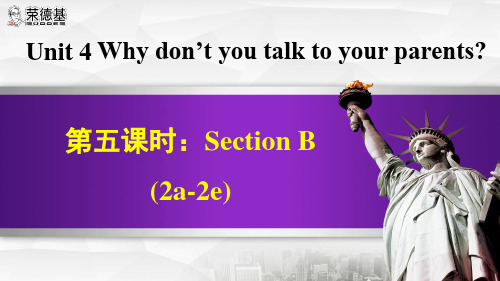
Linda Miller, a mother of three, knows all about such stress. “In some families, competition starts very young and continues until the kids get older,” she says. 4 “Mothers send their small kids to all kinds of classes. And they are always comparing them with other children. 5 It's crazy. 6 I don't think that's fair. Why don't they just let their kids be kids? People shouldn't push their kids so hard.” 7
__c_o_m__p_a_r_in__g______
2d
Read the article again and answer the questions.
1. Does Cathy Taylor think it's important for kids to join afterschool activities? Yes, she does.
The Taylors are a typical American family. 1 Life for Cathy Taylor's three children is very busy. “On most days after school,” Cathy says, “I take one of my two boys to basketball practice and my daughter to football training.
2020年春牛津译林版英语八年级下册—-Unit4知识点梳理
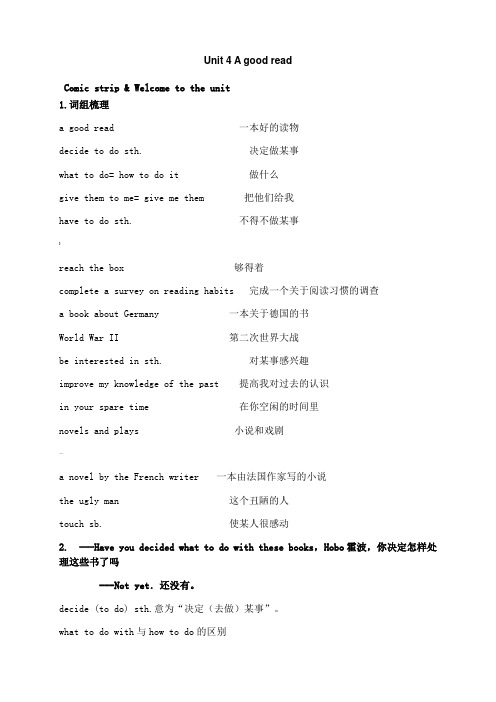
Unit 4 A good readComic strip & Welcome to the unit1.词组梳理a good read 一本好的读物decide to do sth. 决定做某事what to do= how to do it 做什么give them to me= give me them 把他们给我have to do sth. 不得不做某事}reach the box 够得着complete a survey on reading habits 完成一个关于阅读习惯的调查a book about Germany 一本关于德国的书World War II 第二次世界大战be interested in sth. 对某事感兴趣improve my knowledge of the past 提高我对过去的认识in your spare time 在你空闲的时间里novels and plays 小说和戏剧—a novel by the French writer 一本由法国作家写的小说the ugly man 这个丑陋的人touch sb. 使某人很感动2. ---Have you decided what to do with these books,Hobo霍波,你决定怎样处理这些书了吗---Not yet.还没有。
decide (to do) sth.意为“决定(去做)某事”。
what to do with与how to do的区别what to do with中的what不可以换成how,how 一般和deal with搭配。
【I don't know what to do with my old bike.=I don't know how to deal with my old bike.我不知道如何处理我的旧自行车。
not yet意为“还没有”,相当于“No,I haven't.”。
新目标英语八年级下Unit-4-Why-don’t-you-talk-to-your-parents知识点重点短语
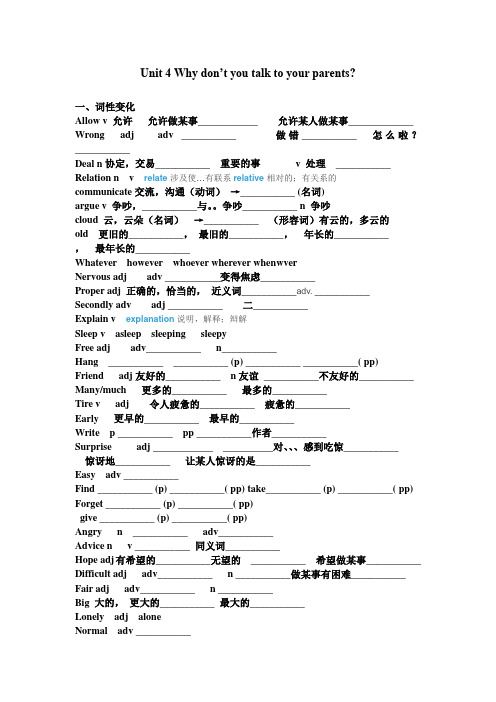
Unit 4 Why don’t you talk to your parents?一、词性变化Allow v 允许允许做某事____________ 允许某人做某事_____________ Wrong adj adv ___________ 做错___________ 怎么啦?___________Deal n协定,交易___________ 重要的事v 处理___________ Relation n v relate 涉及使…有联系relative 相对的;有关系的communicate交流,沟通(动词)→___________ (名词)argue v 争吵,___________与。
争吵___________ n 争吵cloud 云,云朵(名词)→___________ (形容词)有云的,多云的old 更旧的___________,最旧的___________,年长的___________,最年长的___________Whatever however whoever wherever whenwverNervous adj adv ___________变得焦虑___________Proper adj 正确的,恰当的,近义词___________adv. ___________Secondly adv adj ___________ 二___________Explain v explanation 说明,解释;辩解Sleep v asleep sleeping sleepyFree adj adv___________ n___________Hang ___________ ___________ (p) ___________ ___________( pp)Friend adj友好的___________ n友谊___________不友好的___________ Many/much 更多的___________ 最多的___________Tire v adj 令人疲惫的___________ 疲惫的___________Early 更早的___________ 最早的___________Write p ___________ pp ___________作者___________Surprise adj ____________ __________对、、、感到吃惊___________惊讶地___________ 让某人惊讶的是___________Easy adv ___________Find ___________ (p) ___________( pp) take___________ (p) ___________( pp) Forget ___________ (p) ___________( pp)give ___________ (p) ___________( pp)Angry n ___________ adv___________Advice n v ___________ 同义词___________Hope adj有希望的___________无望的___________ 希望做某事___________ Difficult adj adv___________ n ___________做某事有困难___________ Fair adj adv___________ n ___________Big 大的,更大的___________ 最大的___________Lonely adj aloneNormal adv ___________二、重点短语1. why don’t you + 动词原形+ …? = why not + + 动词原形+ …? 为什么不…?2. ___________ 允许某人做某事___________允许做某事3. ___________ 与某人闲逛4. ___________课外辅导班5. ___________. = have a fight with sb与某人吵架/打架6. ___________直到半夜7. ___________. 与某人交谈(单方面的说话) ___________和某人交谈(双方的谈话)8. ___________有空闲时间9. ___________学得过多10. ___________有足够的睡眠11. ___________给某人写信12. ___________打电话给某人13. ___________ 令某人惊讶14. ___________翻看,浏览相当于___________谈论关于…15. ___________ 生某人的气thank sb for +名词/代词/动名词16. ___________重要的事17. ___________成功地发展;解决, 改善18. ___________ 和睦相处;关系良好19. ___________经常吵架/打架20. ___________+ 名词/代词/动名词“擅长于...” ___________对…有好处21. ___________ 拒绝做某事22. ___________ 主动提出做某事= offer sth to sb给某人提供某物23. ___________以便,为了= ___________ (后都跟从句,且从句经常用can,could等情态动词)24. ___________ 介意做某事___________ 介意某人做某事25. without +名词/代词/动名词“在没有…的情况下26 ___________ 与……比较27. ___________使某人生气28. ___________ 担心某事29. ___________抄袭某人的作业30. ___________做自己三重点词法1.Why don’t you talk to your parents? 你为什么不和你打父母谈谈呢?【解析】Why don't you do sth ?= Why not do sth? 为什么不......呢?【拓展】用于提建议的句型有:(1) ___________ ….怎么样?(2) ___________?= Why not do sth? 为什么不呢?(3) ___________.让我们一起做某事吧。
八年级英语(下)第4单元Section B知识详解新目标

Unit 4He said I was hard-working.Section B1.I’m good at speaking.我擅长口语。
be good at/ for/ to辨析:(1) be good at表示“在……方面(学得、做得)好,擅长于”。
如:He is good at Maths. 他数学学得好。
She is good at playing basketball.她擅长打篮球。
注:be good at≥do well inShe is good at English.≥She does well in English.be good for 表示“对……有益处(好处),有利于……”。
如:Taking a walk after supper is good for your health.晚饭后散步对你的健康有益。
注:be good for 的反义词组为be bad for。
如:Watching TV much is bad for your eyes.过多看电视对你的眼睛有害。
be good to 表示“对……和善(仁善)”,相当于be kind to 。
如:She is very good to her students. 她对她的学生很好。
注:to 后接动词原形,则表示“适于……”。
如:Is this water good to drink? 这水适于喝吗?(2) be good at 和do well in辨析be good at 擅长,较笼统地指某一方面有特长、很优秀。
do well in在……成绩好,在...做得好,在……表现好,指在具体某一次活动或某一件事情中做得好或做得出色或指学校功课、成绩好。
现以例子来说明它们意思的区别:You are good at English你英语好,你擅长英语。
You do well in English你英语成绩好(英语成绩好,并不表示你的英语就很好了,比如你在学七年级的英语时很刻苦,成绩好,但尽管你的成绩很好,但你不能说你英语就很好了,你不能说你擅长英语,毕竟你学的只是七年级的英语,另外,说不定会半途而废呢,说不定你八年级英语成绩很差呢。
英语八年级下册4单元2b知识点
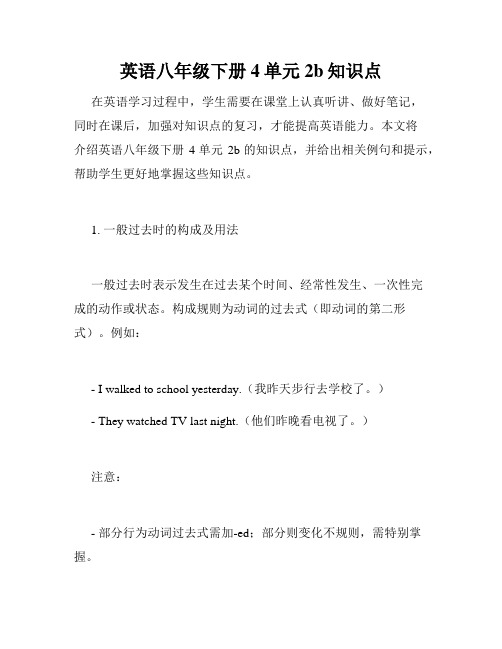
英语八年级下册4单元2b知识点在英语学习过程中,学生需要在课堂上认真听讲、做好笔记,同时在课后,加强对知识点的复习,才能提高英语能力。
本文将介绍英语八年级下册4单元2b的知识点,并给出相关例句和提示,帮助学生更好地掌握这些知识点。
1. 一般过去时的构成及用法一般过去时表示发生在过去某个时间、经常性发生、一次性完成的动作或状态。
构成规则为动词的过去式(即动词的第二形式)。
例如:- I walked to school yesterday.(我昨天步行去学校了。
)- They watched TV last night.(他们昨晚看电视了。
)注意:- 部分行为动词过去式需加-ed;部分则变化不规则,需特别掌握。
- 机会或状况的动词(如be)宜了解变化规律。
2. 一般过去时的否定句和疑问句- 否定句构成:didn't + 动词原形;否定缩写:didn't = did not。
- 疑问句构成:Did + 主语 + 动词原形+ …?例如:- She didn't visit her grandparents last week.(她上个星期没去看奶奶爷爷。
)- Did you play basketball yesterday?(你昨天打篮球了吗?)3. 一般过去时和现在完成时的区别- 一般过去时表示过去某个时间发生的动作,如:I went to Japan last year.(我去年去了日本。
)- 现在完成时则在现在时间之前发生的动作,强调与现在的联系,如:I have visited Japan.(我曾经去日本旅游。
)类似的,情态动词过去式和现在完成时也有不同的用法和含义,需特别注意。
4. 现在完成时的构成与用法- 构成规则为助动词have/has + 过去分词(动词的第三形式)。
- 现在完成时表示过去某一时间发生、但与现在有联系的动作或状态,也可表示截至目前的动作或状态。
例如:- I have learned English for 8 years.(我学习英语已经8年了。
新人教版八年级英语下册Unit4 SectionB知识点讲解
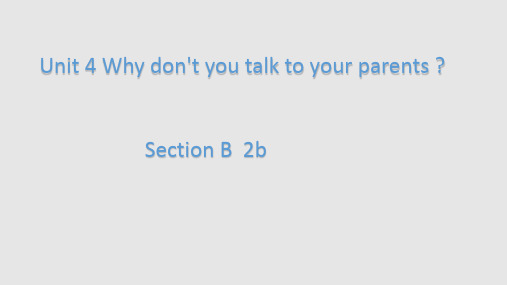
8. And they are always comparing them with other children.她们总是把自己的孩子和其他的孩子作比较。 【解析】compare A with B 将A和B 比较 (1)compare…with… 把……与…..做比较 (2) compare…to… 把…..比做…… (A) ①. People often compare a teacher_____a candle. A. to B. into C. as D. with (B) ②. It’s necessary ____English ___ Chinese in English study. A. compare ; to B. to compare ; with C. comparing ; to D. to compare; into
Dr.Green agrees with Linda . She says too much pressure is not good for a child's development . All these activities can cause a lot of stress for children .Kids should have time to relax and think for themselves .
7.Kids should have time to relax and think for themselves, too. 孩子们也应该有时间放松和独 立思考。 【解析】have time to do sth. 有时间做某事
( A ) Do you have time _____ this game with us? A. to play B. play C. playing D. played
(精编)人教版初二英语下册、unit4知识清单及考点详解

八下 Unit 4.知识清单重点单词Section A 重点高频词汇(优先记忆)1. allow v.允许;准许2. wrong adj.有毛病;错误的3. sweep v.扫;打扫4. floor n.地板5. guess v.猜测;估计6. deal n.协议;交易7. relation n.关系;联系;交往9. argue v.争吵;争论8. communication n.交流;沟通10. cloud n.云;云朵11. elder adj.年纪较长的13. whatever pron.任何;每一15. offer v.主动提出;自愿给予17. secondly adv.第二;其次19. explain v.解释;说明21. copy v.抄袭;效仿;复制;复印12. instead adv.代替;反而;却14. nervous adj.焦虑的;担忧的16. proper adj.恰当的;正确的18. communicate v.交流;沟通20. clear adj.清楚易懂的;明朗的22. return v.归还;回来;返回23. anymore adv.(常用于否定句和疑问句末)再也(不);(不)再重点词汇1. What’ s wrong?哪不舒服?3. big deal重要的事2. look through快速查看;浏览4. work out成功地发展;解决Section B 高频重点词汇(优先记忆)1. member n.成员;分子 1. pressure n.压力2. compete v.竞争;对抗3. opinion n.意见;想法;看法5. typical adj.典型的4. skill n.技艺;技巧6. football n.(美式)橄榄球;足球8. continue v.持续;继续存在10. crazy adj.不理智的;疯狂的13. development n.发展;发育;成长15. usual adj.通常的;寻常的7. quick adj.快的;迅速的;时间短暂的9. compare v.比较12. push v.鞭策;督促;推动14. cause v.造成;引起16. perhaps adv.可能;大概;也许重点词汇1. cut out删除;删去2. compare ... with比较;对比3. in one’ s opinion依 ...看二、重点短语Section A 高频重点短语(优先记忆)1. hang out (with)(和 ...)闲逛3. go to sleep去睡觉2. get into a fight (with) = have a fight (with) (和...)争吵4. writer sb a letter = writer (a letter) to sb 给 ...写信5. call sb (up) = give sb a call给...打电话7. be angry with sb生某人的气9. be nice/friendly to sb 对某人友好6. give sth back to sb = return sth to sb把...归还 ...8. get on with 和睦相处;关系良好10. not ... anymore不再 ...Section B 高频重点短语(优先记忆)1. play sports做体育运动3. get into进入 ...;陷入 ...5. all kinds of各种各样的2. watch movies = see a film看电影4. have lessons上课6. join after -school activities参加课外活动8. learn to do sth学会做某事7. turn down调小turn up调大三、语法总结(一) Why don’t you ...?等提建议的巨型及其常用答语1.在英语中,提意见的常用表达(1) What about doing sth. ?=How about doing sth.? 怎么样?(2) Why don’ t you do sth.?= Why not do sth.?为什么不呢?(3) Let’ s do让sth.我们一起做某事吧。
- 1、下载文档前请自行甄别文档内容的完整性,平台不提供额外的编辑、内容补充、找答案等附加服务。
- 2、"仅部分预览"的文档,不可在线预览部分如存在完整性等问题,可反馈申请退款(可完整预览的文档不适用该条件!)。
- 3、如文档侵犯您的权益,请联系客服反馈,我们会尽快为您处理(人工客服工作时间:9:00-18:30)。
精锐教育学科教师辅导讲义
辅导科目:英语
e.g. The government is made up of men and women elected by the people of the country.
政府是由这个国家的人民选出的人员组成的。
e.g. Tom is standing for election. We elect him chairman of the club. 汤姆是候选人,我们选他为俱乐部主席。
我正在考虑出国。
We consider that the driver is not to blame. 我们认为这不是司机的过错。
consider…(as)…, regard…as…与treat…as…
的意思。
e.g. We talked and talked but couldn’t make a decision. 我们谈来谈去可是没办法决定。
My parents made a decision about my future study at the family meeting.
父母在家庭会议上对于我今后的学业作出了决定。
e.g. You ought to/should obey your parents. 你应该听你父母的话。
You ought not to/shouldn't smoke so much, you are wasting your money. 你不应该吸这么多烟,你是在浪费钱。
I told him that he ought to/should do it. 我告诉他他应该做这件事。
liked walking in the street
enjoyed doing shopping in London
had a very good memory
was good at remembering street names
Step 6: Summary.
What did you learn today?
Please let me know your opinions about it and I will do my best to perfect it .Thanks!
B. take charge of
D. takes the charge of 自私) . He__________lend us his dictionary.
B. agrees to
C. disagreed to
) 5. In order to work better, the writer was sure to put on earphones while working at home.
B
People in different countries have different w1of doing things. Something that is p。
